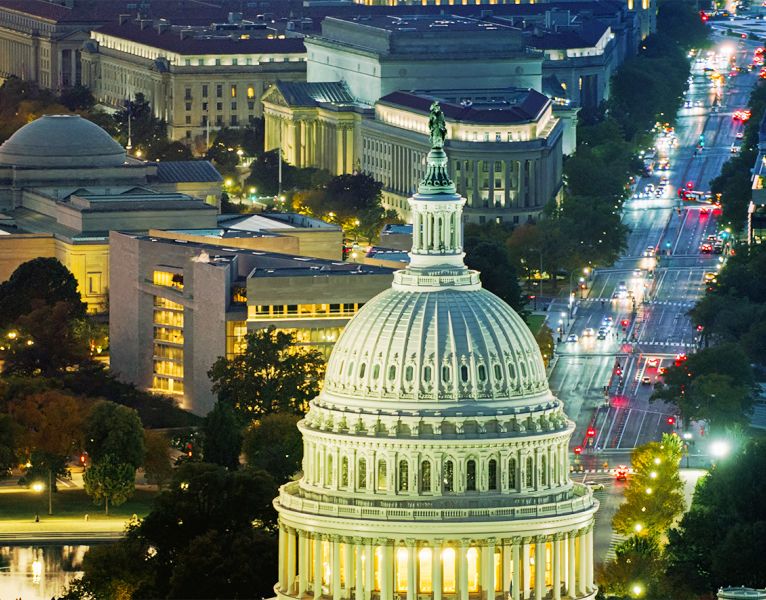This article is part of a monthly column that considers the significance of recent Federal Trade Commission announcements about antitrust issues. In this installment, we discuss the agency's outgoing and incoming chairs and what the leadership shift might mean for companies and consumers.
It was just over three years ago that President Joe Biden appointed Lina Khan to lead the Federal Trade Commission. The youngest-ever FTC chair, Khan had forged her image when she was a law student, becoming famous, or at least antitrust famous, with her Yale Law Journal article, "Amazon's Antitrust Paradox." She drove a reshaping of the agency in that image.
That was then. Now, President-elect Donald Trump has named commissioner Andrew Ferguson to replace Khan as FTC chair.
As we head toward Trump's inauguration, it will be a time for reflection and assessment of Khan's legacy. But only time can reveal the full impact of what Khan leaves behind. Here, we look ahead to what Ferguson may have in store for the agency at the forefront of antitrust regulation and enforcement.
Ferguson joined the FTC in 2023, and since then has consistently dissented from some of the major actions of the Khan FTC.[1]
Before joining the FTC, he served as solicitor general of Virginia, chief counsel to Senate Republican Leader Mitch McConnell of Kentucky, Republican counsel on the U.S. Senate Judiciary Committee, and an antitrust litigator at Washington D.C. law firms.
He is bound to herald a significant departure from Khan's approach and with the possible exception of the commission's stance on Big Tech, he has promised as much.
We highlight three areas of what is likely to stay and what is likely to go in: (1) regulation of Big Tech; (2) the FTC's national noncompete ban and rulemaking; and (3) merger scrutiny.
Big Tech and Online Censorship Stay and AI Regulation Goes
Rigorous antitrust enforcement will not slow down under the new administration, but the focus will undoubtedly change, including when it comes to Big Tech.
Ferguson is seen as critical of Big Tech, but not necessarily for the same reasons as Khan. Instead, taking a cue from Trump, he has focused on content moderation practices, particularly of large social media platforms.
In a concurring statement to last month's FTC v. 1661 Inc.[2] complaint and stipulated order in the U.S. District Court for the Central District of California, for example, Ferguson encouraged the FTC to "use all the tools we have" to investigate "censorious conduct," including "using Section 5 to enforce the penumbra of contract law" — by this, Ferguson apparently means "enforc[ing] the platforms' terms of service," including content policies and "vigorously enforc[ing] the antitrust laws against any platforms found to be unlawfully limiting Americans' ability to exchange ideas freely and openly."
Specifically, Ferguson called out unlawful collusion between online platforms limiting speech, and "advertiser boycotts which threaten competition."
But Ferguson is likely to pull back the FTC's scrutiny of AI. In a concurring and dissenting statement,[3] he criticized the portions of an FTC report on online data collection discussing targeted advertising and AI.
He firmly disagreed with the conclusion that comprehensive federal legislation on AI is badly needed, by several large tech companies, and argued that "the pro-regulation side of the AI debate … is the wrong one," and calling it foolish because, in his view, "a knee-jerk regulatory response will only squelch innovation, further entrench Big Tech incumbents, and ensure that AI innovators move to jurisdictions friendlier to them — but perhaps hostile to the United States."
These kinds of statements are why Trump touted Ferguson as "the most America first, and pro-innovation in our Country's History."
Labor Market Scrutiny Stays and Noncompete Ban and Rulemaking Go
Khan's FTC spent serious time and energy promulgating and defending its rule banning noncompete agreements nationwide.
But Ferguson's FTC will likely abandon it. On June 28, 2024, Ferguson dissented from the noncompete ban.[4] Calling the ban "by far the most extraordinary assertion of authority in the Commission's history," he argued the FTC "do[es] not have the power to issue the Final Rule."
Perhaps reflecting his proclivities as a history major at the University of Virginia, Ferguson reached back to the 1711 Queen's Bench decision in Mitchel v. Reynolds — often cited as the first exposition of what is today known as the rule of reason — which replaced general medieval proscription of noncompetes.
Ferguson's argument is not against regulation of noncompetes itself; it is against federal regulation, noting long-standing "sensible" state regulation of noncompetes. His focus instead was on the lack of evidentiary support and constitutional or congressional authority to promulgate the rule. He also pointed out arbitrary facets of the rule, including a carveout for senior executives.
Ferguson had further words for administrative rulemaking more generally, arguing it "sits uncomfortably in a democracy" because "we are not a legislature; we are an administrative agency wielding only the power lawfully conferred on us by Congress." Thus, Ferguson would start "not … with determining what the right answer to the policy question is, [but to] first assure ourselves of the power to answer the question at all."
Indeed, Ferguson believes "Section 6(g) of the Federal Trade Commission Act does not authorize the Commission to make substantive rules regulating private conduct" at all. Thus, we are likely to see the roll-back not just of the noncompete ban but also any new substantive rule making by the Ferguson FTC.
But scrutiny on labor markets will continue. In another recent dissent, in the Matter of Guardian Service Industries Inc., he noted that the "Commission is wise to focus its resources on protecting competition in labor markets."[5]
Vertical Mergers, Managing Investor Scrutiny and Early Termination Stay
While FTC merger control will of course continue, it will likely soften under Ferguson. Ferguson is focused on the boundaries of authority, including in the merger space. Take Ferguson's Oct. 10, 2024 concurring statement[6] regarding the recent changes to the premerger notification and report form and instructions, and the Hart-Scott-Rodino rule, for example. Unlike the noncompete ban, Ferguson has no doubts that "Congress … gave us authority to promulgate rules governing HSR notification requirements."
Ferguson also lauded some of the final rule's new disclosure requirements as well as the lifting of the early-termination ban. Ferguson noted that more and more deals involve "funds or limited partnerships" with "little public information about their holdings or operations, and in many cases, have no other assets."
But, Ferguson said, "these deals can still present competitive problems through the acquiring person's relationships with other entities," including "minority investors [who] might pull the strings with other entities." This expands the potential reach of merger review to not just the immediate acquiring partner but also its investors and other related parties with management rights.
Ferguson also makes clear he will continue scrutiny of vertical relationships, noting "some anticompetitive transactions have likely slipped through the cracks" because "not every competitive issue shows up in transaction documents or is apparent to Commission staff without experience in the industry." So, he supports increased disclosure of vertical relationships, such as supply relationships, at issue in particular deals.
But Ferguson makes clear that if it's clear there are no competitive concerns — for example, if "the market shares of the two firms are small" — his FTC will "grant … early termination in appropriate cases" — the practice of "informing merging parties that the Commission is terminating its investigation into the merger before the conclusion of the statutory waiting period."
He notes that "most investigations show that the transaction poses little risk of competitive harm," and would avoid the "bureaucratic inertia" and "significant cost and delay for merging parties" that can accompany the opening of an investigation.
Of course, the FTC under Andrew Ferguson and the Trump administration will bring far more changes than these, but we can anticipate at least:
- Increased scrutiny of content regulation practices by online platforms.
- Opposition to regulation of AI technologies, at least for now.
- Continued focus on labor competition and markets.
- Abandonment of the noncompete rule.
- Abandonment of substantive rulemaking.
- Continued scrutiny of vertical and investor issues in merger review.
- In most instances, a more streamlined review process for clearly lawful deals.
In short, if anyone thought the new administration might return antitrust enforcement to a sleepy business as usual, they are mistaken.
Reproduced with permission. Originally published January 3, 2025, "FTC Focus: A Changing Of The Guard," Law360.
[1] https://www.ftc.gov/about-ftc/commissioners-staff/andrew-n-ferguson.
[2] https://www.ftc.gov/system/files/ftc_gov/pdf/ferguson-goat-concurrence.pdf.
[3] https://www.ftc.gov/system/files/ftc_gov/pdf/ferguson-statement-social-media-6b.pdf.
[4] https://www.ftc.gov/system/files/ftc_gov/pdf/ferguson-noncompete-dissent.pdf.
[5] https://www.ftc.gov/system/files/ftc_gov/pdf/guardian-ferguson-dissenting-statement-final.pdf.
[6] https://www.ftc.gov/system/files/ftc_gov/pdf/ferguson-final-hsr-rule-statement.pdf.


